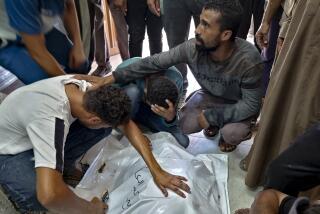Palestinians Keep Order but Tensions Simmer
JERUSALEM — Palestinian police forced demonstrators away from Israeli checkpoints and settlements in the West Bank and Gaza Strip on Saturday, trying to stop the violence that has threatened to derail the Middle East peace process.
The Palestinian-run territories and mostly Arab East Jerusalem remained tense in the wake of four days of fighting that left at least 72 people dead and hundreds injured. There were fewer skirmishes and no new deaths reported, but Israeli and Palestinian officials warned that in the absence of negotiations, the battles between the two sides could easily flare again.
The United States continued intensive diplomatic efforts to arrange a meeting between Israeli Prime Minister Benjamin Netanyahu and Palestinian Authority President Yasser Arafat in hopes of resolving the crisis and salvaging the U.S-sponsored peace process.
But the difficulties involved in scheduling the summit became apparent Saturday.
In Washington, State Department spokesman Nicholas Burns said Secretary of State Warren Christopher had been engaged in “an endless day of haggling with no resolution.”
“We’re still confident there will be a meeting,” Burns said, but he would not predict when. Clinton administration officials said the United States has offered to host the meeting in Washington.
Netanyahu reportedly declined an offer from Egyptian President Hosni Mubarak to hold the meeting in Cairo. Arafat insists that it be held in the presence of Egyptian or U.S. representatives--or both.
“It’s a matter of trust,” said Hanan Mikhail-Ashrawi, minister of higher education in Arafat’s Cabinet, which met in Gaza on Saturday. “We’ve had many bilateral meetings, and they haven’t produced anything. The Israelis either renege or come out afterward and have a different version of what happened, so we need to have another party there.”
Also Saturday, the U.N. Security Council called on Israelis and Palestinians to immediately halt hostilities and resume peace talks. The vote was 14-0 with the United States abstaining.
*
Since the hard-line Netanyahu defeated Prime Minister Shimon Peres in May, Palestinians have become frustrated with the sudden shutdown in talks aimed at producing a permanent agreement--and with his government’s delays in implementing accords that have already been signed. Israel, for instance, has yet to pull its troops out of Hebron, the last West Bank city under occupation, even though the withdrawal was scheduled to take place in March.
A Netanyahu-Arafat summit must produce concrete results or risk inflaming the tensions anew, Palestinian officials said.
“If a meeting is held, it has to succeed,” said Saeb Erekat, a Palestinian Cabinet member and top negotiator with the Israelis.
Israeli officials warned Saturday that the situation throughout the West Bank and Gaza remains extremely volatile. The two areas are “completely unstable,” Defense Minister Yitzhak Mordecai warned in an interview with Israeli television.
Israel imposed new restrictions on the Palestinian territories Saturday, setting up additional checkpoints and preventing most residents from traveling between towns and villages. Since Thursday, Palestinians have been prevented from entering Israel under a closure ordered by Mordecai.
The Israeli army also deployed tanks and other armored vehicles in many areas considered potential flash points for violence, including the entrances to many West Bank communities.
Palestinian police, who fired on Israeli troops in exchanges last week and have been accused of allowing demonstrators to attack the soldiers, seemed determined to try to restore calm Saturday.
In Ramallah, the West Bank city that has been the scene of some of the worst fighting, Palestinian police in riot gear forced thousands of demonstrators away from an Israeli roadblock at one point Saturday. In the Gaza Strip, police kept another crowd of demonstrators from reaching the Israeli army checkpoint at the Erez crossing point from Gaza into Israel.
In Jerusalem, where three Palestinians were killed and nearly 100 wounded Friday when Israeli border police stormed the Al Aqsa mosque compound--an area that Jews refer to as the Temple Mount--and fired on a crowd, the streets were relatively empty. Most merchants in the walled Old City of Jerusalem and along the main shopping streets observed a general strike called to protest the deaths.
Near where the shootings occurred, several groups of young boys took advantage of the quiet to play soccer in the usually bustling alleys. Large groups of Israeli police kept a watchful eye to guard against violence.
But a little farther away, people spoke with outrage and grief of the killings at the compound, one of the holiest sites of Islam.
“This seems like it is the death of the peace process,” said Mohammed abu Kteish, who works as a guard at the Al Aqsa complex. “There is no peace or security for Palestinians now. They kill us even in our holy places.”
He and several others also said Arafat should insist that the Israelis close down the controversial archeological tunnel that sparked last week’s rioting. Palestinians have said that the tunnel, which is near the mosque compound, could weaken the foundations of Al Aqsa and undermine their claims to sovereignty over the Muslim shrines in the compound.
Netanyahu has defended his decision to open the passage and dismissed the Palestinians’ concerns.
Times staff writer Norman Kempster in Washington contributed to this report.
More to Read
Sign up for Essential California
The most important California stories and recommendations in your inbox every morning.
You may occasionally receive promotional content from the Los Angeles Times.










